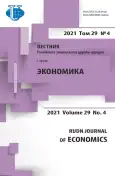Прямые иностранные инвестиции Китая в страны Африки к югу от Сахары
- Авторы: Майкл М.1,2, Глоги Э.О.2, Сильвестр О.1, Дэниел О.Т.3
-
Учреждения:
- Российский университет дружбы народов
- Университет Амброуза Алли
- Университет «Синергия»
- Выпуск: Том 29, № 4 (2021)
- Страницы: 796-805
- Раздел: МЕЖДУНАРОДНОЕ ДВИЖЕНИЕ КАПИТАЛА
- URL: https://journal-vniispk.ru/2313-2329/article/view/324386
- DOI: https://doi.org/10.22363/2313-2329-2021-29-4-796-805
- ID: 324386
Цитировать
Полный текст
Аннотация
Увеличение инвестиций Китая в Африку к югу от Сахары по-прежнему повышает ценность Африканского континента. Китайские инвестиции служат механизмом роста и развития, а также источником финансирования жизнеспособных проектов. Влияние Китая в странах Африки к югу от Сахары и в странах Африки в целом разнится в зависимости от характера привлекательности прямых иностранных инвестиций (ПИИ) и факторов производства каждой страны. Увеличение притока ПИИ из Китая в Африку к югу от Сахары внесло значительный вклад в экономику Африканского континента. Исследование посвящено анализу ПИИ, их преимуществ и политических последствий, детерминант, необходимых для стимулирования и ускорения роста ПИИ из Китая и других стран мира. При этом страны Африки к югу от Сахары должны проводить политику, направленную на создание благоприятных условий для бизнеса, которые привлекали бы больше инвестиций, а также защищали иностранных инвесторов от экспроприации.
Ключевые слова
Об авторах
Мадоджему Майкл
Российский университет дружбы народов; Университет Амброуза Алли
Автор, ответственный за переписку.
Email: agomado@inbox.ru
аспирант, кафедра международных экономических отношений, экономический факультет, Российский университет дружбы народов; преподаватель, Университет Амброуза Алли
Российская Федерация, 117198, Москва, ул. Миклухо-Маклая, д. 6; Федеративная Республика Нигерия, штат Эдо, Экпома, P. M. B 14, KM 70 Benin Auchi RoadЭхичиоя Отоекпашян Глоги
Университет Амброуза Алли
Email: ehichioyaotorkpashanglory@gmail.com
доктор философии, старший преподаватель
Федеративная Республика Нигерия, штат Эдо, Экпома, P. M. B 14, KM 70 Benin Auchi RoadОби Сильвестр
Российский университет дружбы народов
Email: fabiofreed@yahoo.com
аспирант, кафедра всеобщей истории
Российская Федерация, 117198, Москва, ул. Миклухо-Маклая, д. 6Оланреваджу Темидайо Дэниел
Университет «Синергия»
Email: dtemidayo@mail.ru
магистрант, кафедра гражданского права
Российская Федерация, 125190, Москва, Ленинградский пр-кт, д. 80Список литературы
- Agwu, M.E. (2014). Foreign direct investments: A review from the Nigerian Perspective. Research Journal of Business and Management, (1(3)), 318-337
- Asiedu, E. (2003). Capital controls and foreign direct investment. World Development, 32(3), 479-490
- Ayanwale, A.B. (2007). FDI and economic growth: Evidence from Nigeria. AERC Research Paper 165. African Economic Research Consortium, Nairobi. Retrieved April 12, 2021, from www.aercafrica. org/ documents/rp_165.pdf
- Boldeanu, F.T., & Constantinescu, L. (2015). The main determinants affecting economic growth. Bulletin of the Transilvania University of Braşov. Series V: Economic Sciences, 8(2), 329-338. Retrieved June 15, 2021, from https://ashraffeps.yolasite.com/resources/EuroMed/Fall2018/The%20main%20determinants%20affecting%20economic%20growth.pdf
- Borensztein, E., De Gregorio, J., & Lee, J.W. (1998). How does foreign direct investment affect economic growth? Journal of International Economics, 45(1), 115-135
- Donou-Adonsou, F., & Lim, S. (2018). On the importance of Chinese investment in Africa. Review of Development Finance, 8(1), 63-73. Retrieved June 15, 2021, from https://www.sciencedirect.com/science/article/pii/S1879933718300551?via%3Dihub
- Falki, N. (2009). Impact of foreign direct investment on economic growth in Pakistan. Inter-national Review of Business Research Papers, (5(5)), 110-120
- Gorg, H., & Greenway, D. (2004). Much ado about nothing? Do domestic firms really benefits from foreign investment? The World Bank Research Observer, 19, 171-197
- Gottschalk, R. (2001). Lenders and investors’ international portfolio allocation decisions: What do we know? Sussex, Institute of Development Studies
- Liu, Y., Hao, Y., & Gao, Y. (2017). The environmental consequences of domestic and foreign investment: Evidence from China. Energy Policy, 108, 271-280. https://doi.org/10.1016/j.enpol.2017.05.055
- Luo, Y., Xue, Q., & Han, B. (2010). How emerging market governments promote outward FDI: Experience from China. Journal of World Business, 45(1), 68-79. https://doi.org/10.1016/j.jwb.2009.04.003
- Megbowon, C., Mlambo, C., & Adekunle, B. (2019). Impact of China’s outward FDI on Sub-Saharan Africa’s industrialization: Evidence from 26 countries. Cogent Economics & Finance, 7, 1-14. https://doi.org/10.1080/23322039.2019.1681054
- Olofsdotter, K. (1998). Foreign direct investment, country capabilities and economic growth. Weltwitschaflliches Arckive, 134(3), 534-547
- Phillips, P.C.B., & Perron, P. (1988). Testing for a unit root in time series regression. Biometrika, 75, 335-346
- Pigato, M., & Tang, W. (2015). China and Africa: Expanding economic ties in an evolving global context. Working Paper Series, Addis Ababa, Ethiopia
- Sahoo, K., & Sethi, N. (2017). Impact of foreign capital on economic development in India: An econometric investigation. Global Business Review, 18(3), 1-15. https://doi.org/10.1177/0972150917692198 http://gbr.sagepub.com
- Shahbaz, M., & Rahman, M.M. (2010). Foreign capital inflows-growth nexus and role of domestic financial sector: An ARDL co-integration approach for Pakistan. J. Econ. Res., 15, 207-231
- Solomon, H.C., & Eka, O.O. (2013). Impact of foreign direct investment on telecommunication sector on Nigerian economy. International Journal of Modern Social Sciences, 2(3), 195-215
Дополнительные файлы









